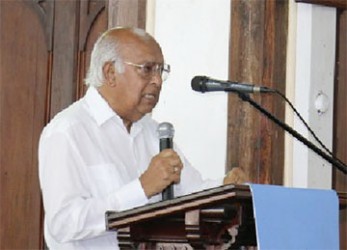Rafiq Khan, one of Guyana’s first radio broadcasters, died yesterday in Kingston, Jamaica at the age of 82.
Khan was admitted to the University of West Indies Hospital on Thursday with an apparent chikungunya infection. He died early yesterday morning.
His eldest son, Rafiq Junior, said his father was an “iconic broadcaster” but he was “more of a good father” who loved his family. Rafiq Junior said his father would be cremated in Jamaica in accordance with his wishes. “This came as a shock to my brother and me, because only yesterday [Thursday] I spoke to him,” he said. “But apparently the chikungunya triggered other complications within him.”
He stated that his father, who had retired in the Caribbean island, had told him last Sunday that he was unwell. “After over 60 years of marriage, our mother died two years ago and he followed… He was a great father who gave us a comfortable life and told us to be educated because no one can steal that from us.”
Yesterday, other renowned broadcasters paid tribute to him.

Advertising tycoon Vic Insanally revered Khan as the “original” broadcaster who was the best Guyana ever had. “I first met Rafiq in the early sixties when I joined broadcasting and what I noticed about him was he was good at recognising the talents in people and pushing them in that direction.
He was the original and he was the best,” Insanally said.
He said Khan had told him that he was working on compiling an autobiography and he was therefore shocked to learn of his death when “he was so full of life.”
“A good manager and a good mentor. A leader in the early days and a friend,” is how Consultant Carlton James remembered him. “It was very easy as the years went on to become friends with someone who shares the same goals. Rafiq knew broadcasting and he was the mentor of probably most of broadcasters in Guyana,” he added.
Merundoi Head and actress Margaret Lawrence said Khan’s death was a great loss to the broadcasting fraternity. “I don’t think they make them like him anymore. Rafiq was everything a broadcaster should strive for,” she said, recalling that Khan had done the broadcast when Guyana achieved independence. “His voice was spectacular… but there are many other things I will remember him for…,” she added.
Auvril Legall described him as one of the most gracious persons she had ever met. “I enjoyed Radio Demerara… working with him and naturally his death came as a surprise to all of us,” she said.
“He was simply gentle. A man who inspired loyalty and confidence. He taught me self-confidence when I was just a young girl, shy. He taught me to be poised and self-confident as I faced the world of work. And for that I am humbled and honoured that he touched my life,” said Shamshun Mohamed.
Khan joined the broadcasting fraternity at the age of 17. He held the post of Programme Director in Radio Demerara in 1956. Later, he went to work as the Management Consul-tant to the Rediffusion Group of Broadcasting Systems in the Caribbean.
In 1979, he began a period of 13 years with UNESCO, 10 of them as Regional Communication Adviser for the Caribbean. He was also lecturer at the University of Guyana and at the University of the West Indies, teaching what he knew best—broadcasting.
In recent years, Khan paid tribute at the passing of several well-known local broadcasters, including Olga Lopes-Seales, Ayube Hamid and Hugh Cholmondeley. Earlier this year, he delivered an obituary on the passing at another of renowned former radio figure, Terry Holder.
On that occasion, he stated: “Fossils like me are long forgotten. But Hugh Cholmondeley strove, failed and is gone. Terry Holder agonised, failed and is now gone. And what of my other protégés – Vic Insanally, Ron Robinson, Rovin Deodat, Carlton James, who are still among you? Perhaps it is more expedient to send them too into pre-mature fossilage?
“Terry Holder, among the last holdouts from an era when standards really mattered, lamented what had become of his beloved country as a whole… while I, an ancient mariner with a narrower perspective, have been searching in vain, amidst the tawdriness of a garbage and concrete jungle, for the Garden City of my youth.
“Is anyone even noticing that the philistines are taking over our city and our country? Even in the little elegant avenue where Terry and I last lived, I see the philistines rising.
“And I am left to wonder how paltry is any tribute of soon-forgotten words to such as Terence Holder?
How long will we ignore our prophets? When will we gather the collective will to stand behind them and say: Enough?”
He said that Holder had been passionate about the disintegration of standards and feared that they might be beyond reclaim. “He feared that the mediocrity of yesterday had become the excellence of today. This insight brought to mind these words of a poet, slightly misquoted:
‘Degradation is a monster of so frightful mien
As to be hated needs to be seen.
Yet, seen too often, familiar with her face,
We first endure, then pity, then embrace.’
“The question therefore becomes: How can a generation that has embraced degraded values be made to recognise perennial excellence?” Khan had asked at the memorial service.





